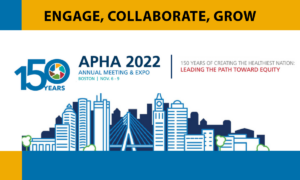In 2022, the National Health Care for the Homeless Council chaired the development of the Caucus on Homelessness (CoH) program for the American Public Health Association (APHA) 2022 Annual Meeting and Expo. The theme of the annual meeting was: “150 Years of Creating the Healthiest Nation: Leading the Path Toward Equity.”
Social equity is, as defined by the National Academy of Public Administration, “the fair, just and equitable management of all institutions serving the public directly or by contract; and the fair and equitable distribution of public services, and implementation of public policy; and the commitment to promote fairness, justice and equity in the formation of public policy.” The CoH program highlighted the value of this theme to health care for the homeless (HCH) research and to the often marginalized and underserved groups with which we work, particularly considering the disparities that have been brought further to light over the last two years of the pandemic.
Topic Areas
Members of the Caucus were given the opportunity to submit presentations under the following suggested topic areas related to social equity: housing equity; race and ethnicity; sex, gender, and sexuality; educational access and imbalance; criminal justice systems; disability justice and ableism; religious and spiritual communities; mental & physical health; and programming related to the American Rescue Plan: Build Back Better.
Authors as Subject Matter Experts
Submitting authors have been compiled by the National Health Care for the Homeless Council into categories related to their submitted topic areas. Records of submitted authors that were not accepted are also still accessible to the Council for potential inclusion as Subject Matter Experts in their respective areas.
Sessions
Submissions were reviewed, scored, and accepted based on adherence to theme, relevance to the field, innovation and replication, and abstract quality. Accepted oral submissions were grouped together by theme into the five sessions listed in the summary below, for a total of 20 unique oral presentations. Ten poster submissions were also submitted and presented as one-on-one individual presentations during their allotted function time. The summary below includes the session titles as identified by common themes of accepted presentations. A link to the full program is available for session objectives, presentation summaries, and author information.
Download Full Event Summary


